VIDEO
Kellee Van Horne (Director of Client Success at Affirm) shares guidance from her time counseling younger employees about career moves. She distilled the guidance into 3 key principles: choose your boss and reporting chain carefully, prioritize roles where you have a differentiating skill or area of expertise, and be clear on what skills or content you want to learn in your next role.
Like what you see here? Our mission-aligned Girl Geek X partners are hiring!
- Check out open jobs at our trusted partner companies.
- Watch all Elevate 2021 conference video replays!
- Does your company want to sponsor a Girl Geek Dinner? Talk to us!
Transcript
Sukrutha Bhadouria: We have our next speaker, Kellee. She’s the Director of Client Success at Affirm. Before Affirm, she spent seven years at LinkedIn leading sales and marketing. Kellee has had a range of financial leadership positions, including CFO for africa.com and Lead Financial Manager for a food sustainability startup. We always meet colleagues looking for their next opportunity internally or externally. So this talk is perfect for us. Welcome, Kellee.
Kellee Van Horne: Thank you so much. I’m so happy to be here with all these amazing women on International Women’s Day. I’m going to share my screen and you guys can let me know if you do not see it. Otherwise, I’ll get started. So this talk today is focused on one of my most passionate subjects: how do you accelerate your career? How do you really get work that matters to you and that you think makes an impact?
Kellee Van Horne: And so today, I’m going to talk through some of the things that I focus on when I’m managing my career and the things that I always tell other women when I’m giving them mentorship and advice. So I just got an introduction. I’ll do a quick one, again. Director of Client Success at Affirm. I’ve spent 18 years in sales, marketing, tech, and financial services. And in my free time, I’m the mom of three lovely, fun, and energetic children. And so you can usually find me building a fort on the weekend when I’m not working.
Kellee Van Horne: Like I said, I have a lot of career conversations. I love having career conversations with people, both because I know it’s so important to how you see yourself and also how you think about how you want to make your way in the world. And one of the things that always comes back when we start talking about career conversations are what are the right questions to ask when you’re considering a new opportunity? And for me, it really boils down to three main focus areas.

Kellee Van Horne: One, who? Two, why me? And three, what next? And so I’ll talk about why these things are important and why I ask these questions. But before I go into that, I wanted to spend a little bit of time on why even asking these questions in the first place is really important. We’re obviously seeing a lot of focus on equity and particularly gender equity in the workplace. And we’ve started to see some progress at the top.
Kellee Van Horne: If you look at the Women in the Workplace study by McKinsey, we’re seeing that SVPs have increased from 23% to 28% representation of women. And in the C-Suite, we’re seeing about 17%… Sorry, 21% up from 17% of women are in the C-Suite now but there’s really a broken ladder. And this primarily happens in your entry-level careers, right when you’re going from individual contributor to manager, where we’re seeing about 100 men promoted for every 85 women to an entry-level manager position.
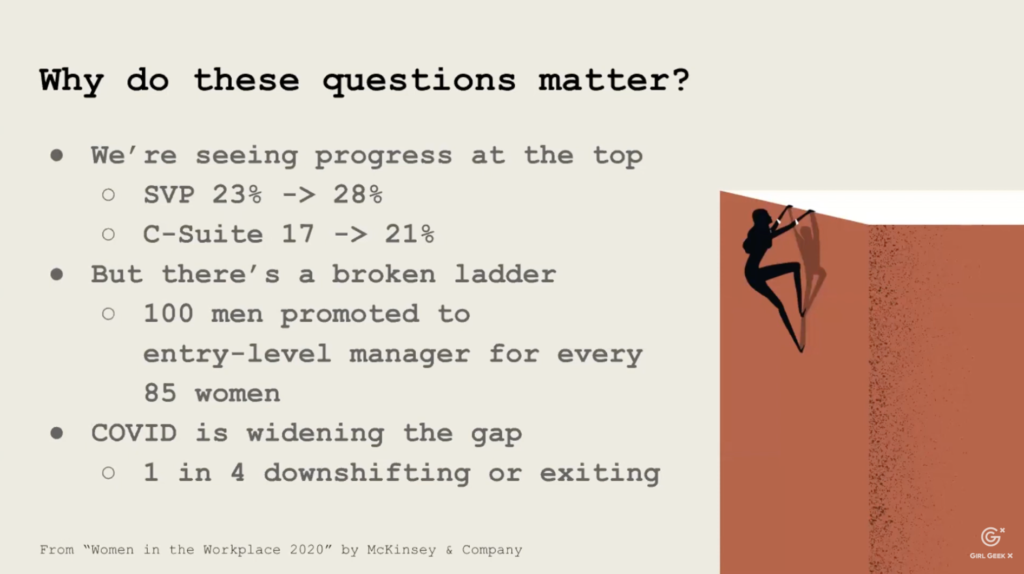
Kellee Van Horne: And so what continues to happen is that these promotions continue to accelerate and you’ll end up with a distribution where your management organization will be 62% men and 38% women. And I am a person that loves justice and I love fairness. And that doesn’t sound just and that doesn’t sound fair when we have 50% of our U.S. population is women. And so how do we think about addressing this inequity in the work that we do?
Kellee Van Horne: The other thing I’ll mention is that COVID is really widening the gap that we’re seeing in terms of women’s representation in the workplace, particularly in leadership, where one in four women have expressed interest in either downshifting or exiting the workplace because of the additional responsibilities that’s placed on them for COVID either because of childcare or because of elder care.
Kellee Van Horne: And so it’s really, really critical for everyone in this room to think about as you’re thinking about your career, how can I create a support system around myself? How can I create a sustainable career working with people that really believe in me and who think my work matters so that it can help you to retain yourself essentially in the workplace? Because it’s not easy, right? There’s a lot of things that are stacked against you from a statistical perspective. And so what can you do personally to accelerate your own personal experience?

Kellee Van Horne: And so I always start with who? I’ll give you guys a quick story. So I was working at LinkedIn in the summer of 2015, and I got called into a conference room by my HRBP, which is never usually a great conversation. And the nuts and bolts of it was I was losing my team. My scope and responsibility was being significantly downsized. And I basically had the choice of taking this new role, or looking for another role internally, or taking a severance package. This was challenging because I had no boss for the past three months. I’d been reporting ostensibly to another leader. But that person really didn’t have any responsibility for me and didn’t really spend a lot of time coaching or understanding the work that I was doing. I was also about six months pregnant at the time with my first child. And so I was feeling particularly vulnerable in that moment, just knowing that I had to make a very quick decision around choosing a job that I didn’t want and wasn’t excited about.
Kellee Van Horne: Taking a severance package that would end right before I delivered my very first baby, or finding a new job in a couple of months and hoping that someone’s going to take a chance on me to hire me and then leave my head open, because they lose that head count when they hire me while I’m out on maternity leave for five or six months. It was a very hard time and probably one of the lowest points in my entire career if I’m being honest. But what I ended up doing was I hustled. I spent a lot of time understanding the job opportunities that were around me. And I ended up deciding to not go for the job that would be closest to the experience that I had last time. But I ended up trying to choose a role based on the person that I would be reporting to. So I found a role that was reporting to a woman that I’d known as a colleague at my time at LinkedIn, and was very well respected in the organization.
Kellee Van Horne: I respected her a lot and she also respected me, which was really, really critical and important because I knew I would be coming back to work in a role that I’d never been in before. I’d never taken care of a child before, I had no idea what that would throw at me. And I knew I needed to be in an environment where the people around me really cared about me and about my experience not just as an employee, but also as a human being. And so it ended up being one of the best career decisions that I’ve ever made in my entire life. I not only learned more than I’ve ever learned in any other career role from the leader that I decided to go work for, but I also came back to an environment where I felt trusted, where I felt respected and where I knew that people had my back when I made tough decisions or when I took risks. And so from then on, every single decision that I make around career has been first and foremost who will I be working for?
Kellee Van Horne: And even more importantly, who will that person be working for? Because I want to make sure that the organization that’s standing behind me is one that I believe in and that believes in me. And so what I really would suggest for everyone as you’re thinking about your next career opportunity or next move, ask yourself these two questions. First, is the person you’re going to be working for a rockstar? Are they well-respected in the organization? That means that they are in a position to accelerate their careers and when their careers accelerate, your career will also likely get some tailwinds and accelerate as well. Does the person think you’re a rockstar, right? You want someone that really trusts you. When things get hard, you want someone that’s going to pound on the table for you. And so evaluating people based on whether or not they’ll do that is one of the things that I always recommend.
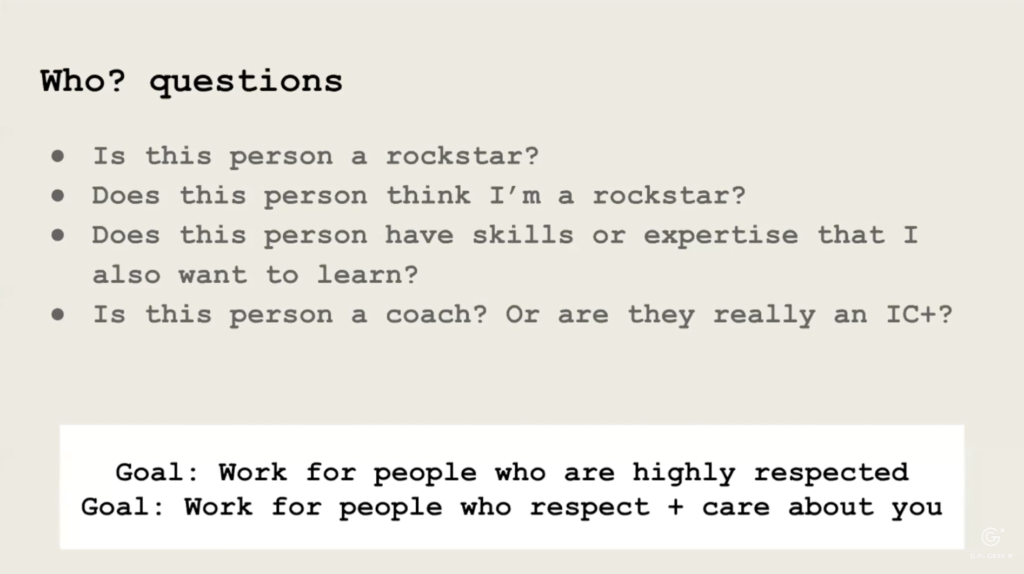
Kellee Van Horne: Does the person have skills or expertise that you want to learn, right? It’s really important, particularly when you’re early in your career, to be in constant learning mode. And that’s what your manager is for, is to help you build skills. And then again, is the person the coach? Or are they really just an IC? I think one limitation of a lot of organizational structures is that a lot of people end up managing not because they want to be managers, but because they see that as the only way that they can accelerate their careers. And so you have to decide and understand who the person is that you’re going to be reporting to. Are they a coach? Or are they an IC+? It’s okay to work for an IC+ actually, if you’re late enough in your career and stable enough in your skillset that you don’t really need someone managing the day to day.
Kellee Van Horne: But I’d say if you’re early in your career, let’s say the first 10 years, I would really strongly encourage you to look for people that are really coaches, because that’s when you’re going to be developing those foundational skills that allow you to excel as you get later and later in your career. I’ll pause here to see if there are any questions. Ah, what is an IC? Excellent question. Individual contributor. So someone who works on their own behalf, doesn’t manage anyone versus a manager. Yeah. Great. So yes, TLDR work for people who are highly respected, work for people who respect and care about you. So the next question you’ll want to ask yourself is why me? And so this isn’t really a question of why would they ever choose me? It’s really what is going to allow me stepping into this role to immediately have early wins and successes that demonstrate my credibility and competence in this role?
Kellee Van Horne: You want to have a really strong answer for that, and so I’ll talk a little bit about my experience. When I was leaving LinkedIn, I decided to go to a company called Affirm that I mentioned earlier. And it’s completely different from the work that I was doing at LinkedIn. It’s a different industry, that’s focused on retail, financial technology, credit and lending, whereas I was in the marketing and employee advocacy space before I left LinkedIn. And so ostensibly, there’s not a lot that I can draw on to make sure that I’m successful in my first time and role at Affirm. But the great thing was I actually had quite a bit of foundational skills that I could draw on to make me successful when I got to Affirm. So one, I’m a customer facing professional, and that’s something that I can do in any environment. I know how to work with people. I know how to build relationships with external customers.
Kellee Van Horne: I also really know how to collaborate well, right? And so when I work in a complex business like the one that we have at Affirm, I can really lean on those skills and accelerate my ability to add impact because I’m able to work with almost anyone in any kind of team, and that’s a huge asset to me. And then also, I really like working in a startup environment where we’re building things from scratch and I don’t mind ambiguity. And so that’s an additional skillset that I brought to my role at Affirm that allowed me to add value really, really early on, even though I was still learning the business. And so as you think about and evaluate different career opportunities, don’t just think about what will be the biggest stretch for you, also think about what will give you the opportunity to have early wins and demonstrate your credibility and your competence so that people will continue to give you more and more stretches?
Kellee Van Horne: As you think about what skills and things that you want to really lean into for your new role, you should think about what are the most pressing problems that are facing your future manager or team, right? You want to solve the problems that matter the most for the business, not just the ones that you find most interesting. And then also, what are the skills or experience that you’re going to leverage into those problems? Where are the places where you can add unique value, really focus on that. And again, your goal is to crush your new role as quickly as possible. And so I see there are some questions, I’m going to try to see if I can get to them. There they are.
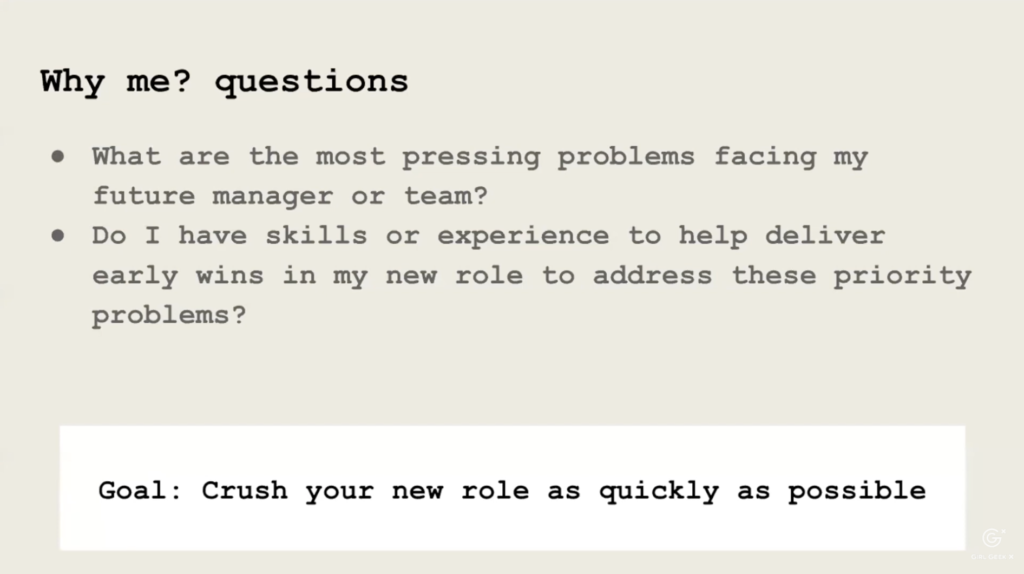
Kellee Van Horne: Q&A maybe. How do you find out if the person you want to work for is a rockstar? Excellent question, particularly if you’re coming from outside of the organization. So everyone, hopefully, when you’re going through an interview process will get to meet both the person that’s going to be managing you, but also the people that report into that person. You should ask the question, and not directly, are you a rockstar? But rather ask questions about the results that that person has delivered. Ask the person and ask their team. What are the things that this person is known for? What are the results that this person has driven in the organization? That will allow you to understand are there things that they’ve done that people would consider to be really great?
Kellee Van Horne: And the way that people talk about those results will give you an indication of is it an okay result? Or is it an amazing result? The other thing I’ll say around looking for a coach, particularly if you’re applying from outside of the organization, is you should absolutely ask people when you are interviewing with them what is their leadership style? What is their coaching style? How do they invest in their team? Some people will have really robust answers and that will give you an indication of how much time they spend thinking about and making an effort towards that.
Kellee Van Horne: And then similarly, you want to ask the team that, right? When you meet other people that would be your colleague when you’re interviewing, ask them, what is it like to work for, blah, blah, blah? What are some ways that you guys are working together to build your skills or to build your career? It’s a very fair question. And if anything, it shows that you’re being really thoughtful about your career path. So I would definitely encourage everyone to start asking those questions if you’re not already. There are some Q&As that I’m not sure how to get to. So maybe someone will add them to the chat if you can see them, and I’ll keep going and I’ll make sure we answer them before we get done. So what next? This is really a conversation around where you think the next role is going to take you in terms of the next five years, 10 years, so on and so forth.
Kellee Van Horne: And the reason that you want to ask yourself this when you’re evaluating career opportunity is because you want to start thinking about can I set myself up for that next thing through the role that I’m taking? Part of that, right, again is building the requisite skills for that next job. And so focusing your early wins on building in skills that will allow you to take on more more quickly. But also, it’s about painting a picture for the people around you, around what you want to do with your career so that they can help you. One of the biggest things that we all need is more help from other people, and I am definitely guilty of it and I know so many people that are guilty of it as well is asking for help, asking people to give you advice, asking people to give you opportunities. And so the more you can talk about what you need and what you want next, the better it is.
Kellee Van Horne: And just keep in mind that most corporations, most companies, will plan in advance at least six months and some up to, let’s say, three years or five years out, right? And so think about the long-term timeline as opposed to what do you want to do next month or next week. Give your manager, give the organization some time to find something that’s really transformational for you and that’ll allow you to leverage into the opportunity when it’s there as opposed to just trying to force yourself into something right away, because it feels urgent. The more time you have to find the right thing, the better. And the more time your manager has to find right thing, the better.
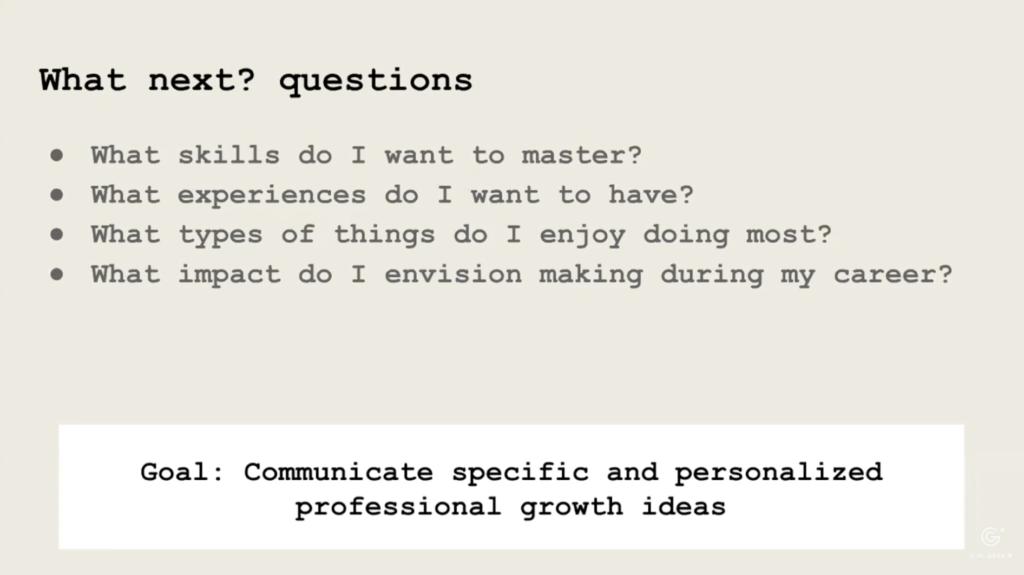
Kellee Van Horne: And so the what next questions that you want to ask yourself, what skills do I really want to master? What experiences do I want to have? What types of things do I enjoy doing most in my career? And what impact do I envision making during my career? And those are the types of conversations you want to be having with the people around you as you talk about how you want your career to evolve in an organization.
Kellee Van Horne: And so I’ll give an example. When I was at LinkedIn, before I left, I was talking to my current manager about the fact that I really wanted to continue to hone my sales skillset. I was on the customer side and working with current customers, but I wanted to do a better job of building relationships that were net new and really have the opportunity to focus on that. And so I said that to her and I spent probably about six months crushing it in my current role, and also just socializing this idea that that’s something that I wanted to grow into as I continued to do my work at LinkedIn. And so lo and behold, after about six months, they said, “Actually, we are going to start off a sales specialist role supporting another organization, and we think you would do a great job as being the very first person to take it.”
Kellee Van Horne: They would never have thought of me if I hadn’t raised my hand early on and said, “This is something that I want to grow towards. Not that I need to do it today, but that it’s something that is on my mind as I round out my skills as a professional,” right? And so I definitely, as a manager now, really appreciate when people can flag things to me early and let me know so that I can keep things in mind as we continue to evolve as an organization. And so the goal is to communicate really specific and personalized ideas around how you want your career to grow. I’m going to go back to the chat really quickly. How do you balance the possibility that the organization will change and people will move around? Absolutely. That always happens. And you should always expect that the organization will definitely change and that people will move around.
Kellee Van Horne: And so what I always say these days is if there’s a reorg and you don’t like things, just wait another six to 12 months, there will be another reorg. If you were working for someone that you really like and respect, sometimes there’s the opportunity to follow that person, right? If you think that that’s required. Or what you also can do is try to consider is the new person that you’re going to be working for, could they also be an advocate and a mentor for you, right? So then you have now two people in the organization that really respect and care for you just as you respect them. And so it’s really about partnering with the person that’s managing you to try to see if you can establish that kind of trust or relationship where you’re allowed to take risks and be creative. And in return, you get support and the ability to take on more.
Kellee Van Horne: And so if it doesn’t work out, that’s fine. There’s literally millions of jobs in the world. So don’t feel like you have to nail it every single time. But as you’re thinking about the next thing after that reorg happens, just keep in mind for who’s going to be the next person that I want to work for. I’ll go really quickly to the rest of the skills that I would recommend focusing on and then would love to go to questions again. So we talked about making it specific and personalized. One thing that I’ll definitely say since I’ve been managing for quite a few years now is that almost everyone that I’ve managed on the client success side, customer success side, has expressed an interest in being a manager at some point. And so everyone has said, “My next play, my next thing I want to do is manage someone or coach someone. I really love doing that.”
Kellee Van Horne: And I really appreciate it because it definitely demonstrates that the people that work in our organization care about others, right? It’s a quality and a trait that you really want to have in your employees. But the challenge is that it’s not differentiated at all, right? And so if everyone’s a manager, then no one will report to anyone, right? It’s impossible to make everyone that’s good a manager on the same team. And so that doesn’t mean, right, that there’s no opportunity on our team. It just means that we need to be more thoughtful about what actual skills you want to build external to just managing.
Kellee Van Horne: And so I’ve got some brainstorm skills that might be helpful as you’re thinking about what are the skills that you want to talk about and lean into outside of maybe just growing your team, growing your scope? And so on the left, you have some soft skills that Udemy has said are the hottest skills based on the learning curriculum that people are reading.
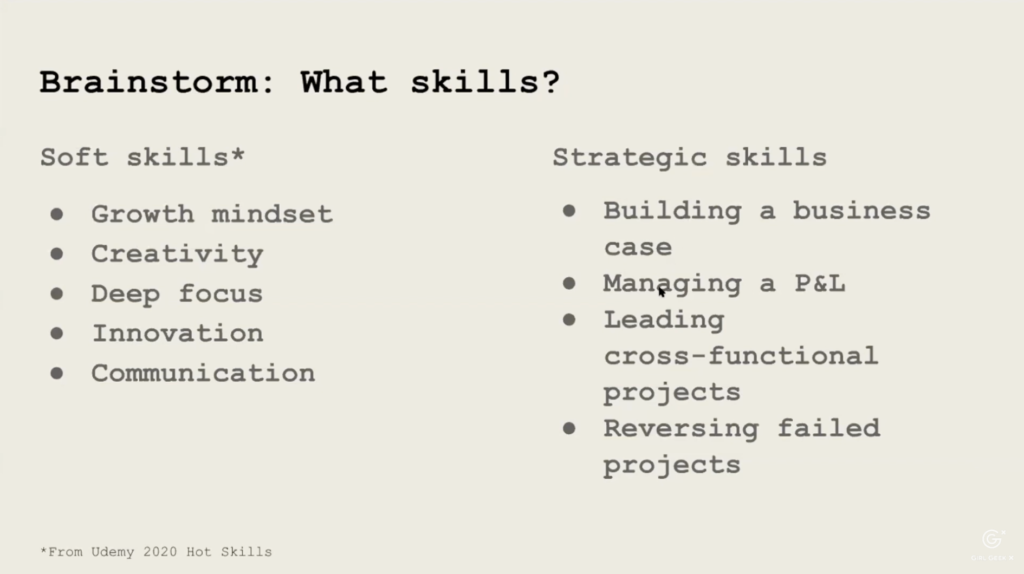
Kellee Van Horne: And then on the right, I’ve put some skills that I think are really valuable to leaders as you get more and more senior, right? Understanding how to build a business case, understanding how to manage a P&L if you’re on the business side. Being able to lead a cross-functional project, right, is often a relevant no matter what kind of function you’re in. And then turning around failures, that’s something that’s really hard to do, but if you get good at it, it’s very, very, very valuable.
Kellee Van Horne: We talked about a few things in finding your next career opportunity. First, who? Who are you going to work for? Who’s going to be your partner as you accelerate your career? Why me? What are the things that are going to allow you to really crush it and build credibility in your role so that when it’s time for what next, people are already looking at you and thinking about how they can help you get to the next level?
Kellee Van Horne: It’s really, really simple in a lot of ways, but I think that it’s probably the most foundational advice that I can give and the things that I say over and over again when you have the chance to meet me one-on-one. Hopefully, this is helpful to everyone. I’ll shift back to questions because I think I have one minute. Let’s see if there’s one more that I can answer. How can people who are introverts do this? Ah, so that’s an interesting question. I think I would consider myself to be an introvert honestly.
Kellee Van Horne: I guess if you’re defining introvert as someone that doesn’t like spending time with other people or feels uncomfortable spending time with other people, I would definitely encourage you to continue to work on that skill in a safe space with a friend, because so much of business, so many opportunities come from the people that you know, right? And so you have to have at least some minimum level of rapport and then also understanding with the people around you to be able to be thought of in the moment, right?
Kellee Van Horne: It’s really hard for people to think of you and think of you for opportunities if they don’t actually know what you want to do next. And so not to say that you should change being an introvert because that is who you are, but rather think about how do you make it so that people can get to know you and know what you like to do so that they can think of you in the future? And I think that timer told me I was at time, so I will stop now.
Angie Chang: Perfect. Thank you, Kellee. There’s so many questions for you in the chat, in the Q&A. If you have a minute or two after this, feel free to pop in the chat and answer some.
Kellee Van Horne: Oh, sure. Yeah, I’ll answer them.
Angie Chang: Thank you so much. That was excellent. I think a lot of people felt very heard and helped, and we are a lot of introverts here at the Girl Geek X team, so we completely empathize that it is possible to do many things as an introvert. So definitely.
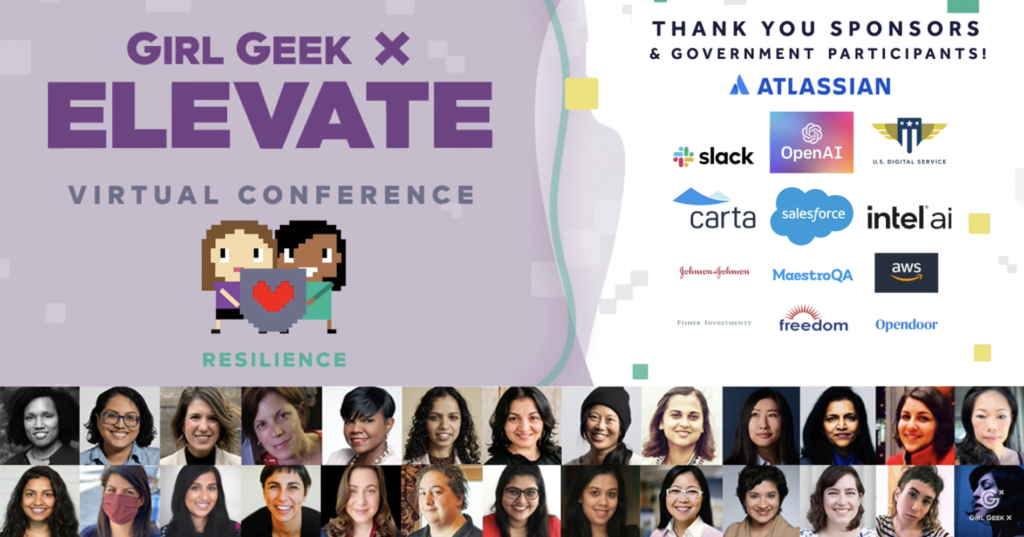
Like what you see here? Our mission-aligned Girl Geek X partners are hiring!
- Check out open jobs at our trusted partner companies.
- Watch all Elevate 2021 conference video replays!
- Does your company want to sponsor a Girl Geek Dinner? Talk to us!


